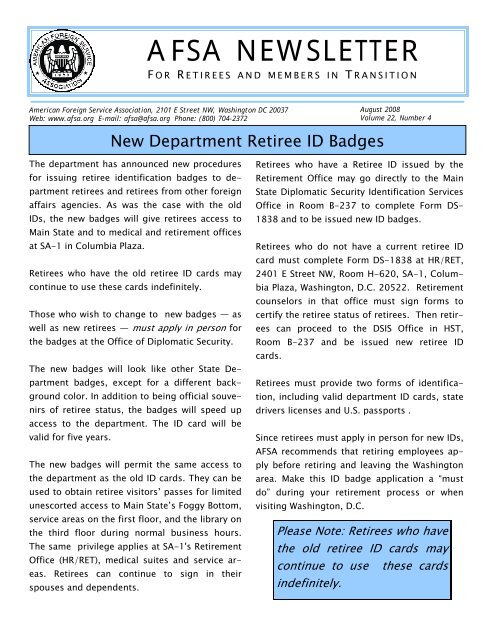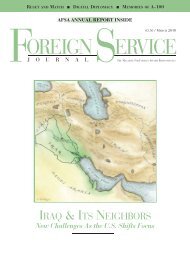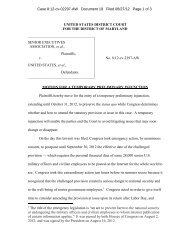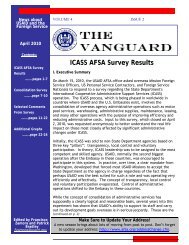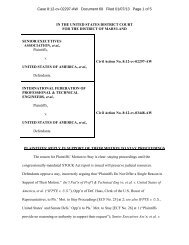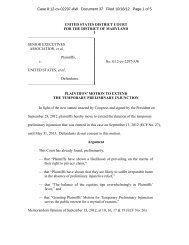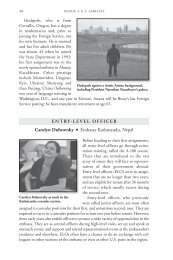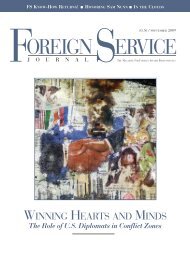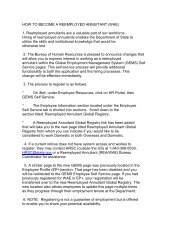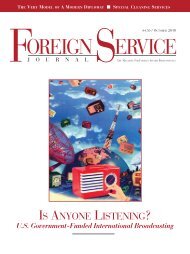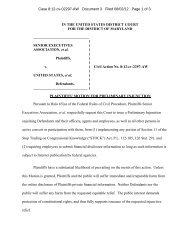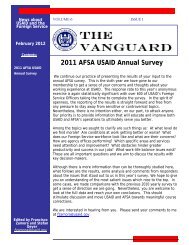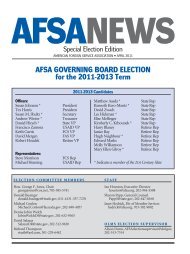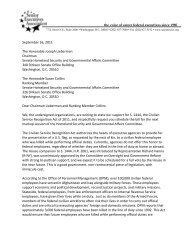August 2008 Newsletter - American Foreign Service Association
August 2008 Newsletter - American Foreign Service Association
August 2008 Newsletter - American Foreign Service Association
Create successful ePaper yourself
Turn your PDF publications into a flip-book with our unique Google optimized e-Paper software.
AFSA NEWSLETTER<br />
FOR RETIREES AND MEMBERS IN TRANSITION<br />
<strong>American</strong> <strong>Foreign</strong> <strong>Service</strong> <strong>Association</strong>, 2101 E Street NW, Washington DC 20037<br />
Web: www.afsa.org E-mail: afsa@afsa.org Phone: (800) 704-2372<br />
<strong>August</strong> <strong>2008</strong><br />
Volume 22, Number 4<br />
New Department Retiree ID Badges<br />
The department has announced new procedures<br />
for issuing retiree identification badges to department<br />
retirees and retirees from other foreign<br />
affairs agencies. As was the case with the old<br />
IDs, the new badges will give retirees access to<br />
Main State and to medical and retirement offices<br />
at SA-1 in Columbia Plaza.<br />
Retirees who have the old retiree ID cards may<br />
continue to use these cards indefinitely.<br />
Those who wish to change to new badges — as<br />
well as new retirees — must apply in person for<br />
the badges at the Office of Diplomatic Security.<br />
The new badges will look like other State Department<br />
badges, except for a different background<br />
color. In addition to being official souvenirs<br />
of retiree status, the badges will speed up<br />
access to the department. The ID card will be<br />
valid for five years.<br />
The new badges will permit the same access to<br />
the department as the old ID cards. They can be<br />
used to obtain retiree visitors’ passes for limited<br />
unescorted access to Main State’s Foggy Bottom,<br />
service areas on the first floor, and the library on<br />
the third floor during normal business hours.<br />
The same privilege applies at SA-1's Retirement<br />
Office (HR/RET), medical suites and service areas.<br />
Retirees can continue to sign in their<br />
spouses and dependents.<br />
Retirees who have a Retiree ID issued by the<br />
Retirement Office may go directly to the Main<br />
State Diplomatic Security Identification <strong>Service</strong>s<br />
Office in Room B-237 to complete Form DS-<br />
1838 and to be issued new ID badges.<br />
Retirees who do not have a current retiree ID<br />
card must complete Form DS-1838 at HR/RET,<br />
2401 E Street NW, Room H-620, SA-1, Columbia<br />
Plaza, Washington, D.C. 20522. Retirement<br />
counselors in that office must sign forms to<br />
certify the retiree status of retirees. Then retirees<br />
can proceed to the DSIS Office in HST,<br />
Room B-237 and be issued new retiree ID<br />
cards.<br />
Retirees must provide two forms of identification,<br />
including valid department ID cards, state<br />
drivers licenses and U.S. passports .<br />
Since retirees must apply in person for new IDs,<br />
AFSA recommends that retiring employees apply<br />
before retiring and leaving the Washington<br />
area. Make this ID badge application a “must<br />
do” during your retirement process or when<br />
visiting Washington, D.C.<br />
Please Note: Retirees who have<br />
the old retiree ID cards may<br />
continue to use these cards<br />
indefinitely.
Page 2 AFSA <strong>Newsletter</strong><br />
For Your Information<br />
COLA Jumps to 6.2 Percent in July<br />
<strong>Foreign</strong> <strong>Service</strong> retirees, whose annuities and<br />
Social Security benefits are increased each year<br />
by the cost of living adjustment will be pleased<br />
to know that the COLA increased by 0.5 percent<br />
to 6.2 percent in July.<br />
The COLA is based on changes in the consumer<br />
price index from the third quarter of one calendar<br />
year to the next. Retirees have accumulated<br />
6.2 percent toward the 2009 COLA, with two<br />
months remaining in the counting period. Cost<br />
of living adjustments sustain the value of federal<br />
annuities, survivor annuities and Social Security<br />
payments by adjusting these payments to<br />
keep pace with inflation. <strong>August</strong> price indices<br />
will be released on Thursday, Sept. 16.<br />
There is a possibility that the COLA will rise<br />
considerably more before the end of the counting<br />
period, and that this may tempt Congress<br />
to reduce or delay the start of the 2009 adjustment<br />
for federal annuities. While Congress<br />
passed the first law requiring automatic COLA<br />
increases for federal retirement benefits in<br />
1962, it has adjusted the formula for calculating<br />
it or the date on which the COLA takes effect<br />
more than a dozen times since then. Although<br />
Congress could by law do the same<br />
with respect to the Social Security COLA, this is<br />
not likely to happen.<br />
Please note that the full COLA applies to annuities in the old<br />
retirement system, FSRDS. In contrast, the new system,<br />
FSPS, uses a somewhat more complicated formula to provide<br />
a smaller benefit. If the change in the COLA is between<br />
2 percent and 3 percent, the FSPS COLA becomes 2 percent.<br />
If the COLA increase is more than 3 percent, the FSPS COLA<br />
becomes 1 percent less than the increase.<br />
SLF Planning for Change Seminar<br />
The Senior Living Foundation of the <strong>American</strong> <strong>Foreign</strong><br />
<strong>Service</strong> is pleased to announce that it will host<br />
its “Planning for Change” seminar on Sept. 18, <strong>2008</strong>,<br />
from 1 to 5 p.m. with a reception immediately following.<br />
The event will be held at the Beacon Hotel located at<br />
1615 Rhode Island Avenue NW in Washington,<br />
D.C. This year’s invited speakers are experts in the<br />
fields of prescription medication concerns for seniors,<br />
Medicare and Social Security, as well as wills<br />
and trusts. The series of informative discussions<br />
will explore many areas in which understanding and<br />
advanced planning make all the difference.<br />
If you would like to attend the “Planning for Change”<br />
seminar or get more information, please contact the<br />
Foundation at (202) 887-8170 or at<br />
info@slfoundation.org. Space is limited, so RSVP<br />
today!<br />
WETA Invitation<br />
AARP and WETA 26 are inviting AFSA Retirees to a<br />
live taping of public television’s longest-running<br />
news and public affairs program, Washington Week<br />
and National Journal with Gwen Ifill. The event will<br />
take place on Friday, Sept. 5, <strong>2008</strong> at 5:45 p.m. at<br />
the George Washington University Lisner Auditorium.<br />
The taping includes a Washington Week extra :<br />
an additional half-hour special, featuring a question<br />
and answer session with the audience. A reception<br />
will follow.<br />
Guests must be seated by 5:30 p.m. Taping begins<br />
at 5:45 p.m. This free event is open to the public,<br />
but reservations are required.<br />
For tickets, please call (703) 998-2691, or e-mail<br />
lcircle@weta.com.
Page 3 AFSA <strong>Newsletter</strong><br />
Some Legislative Issues To Watch<br />
Medicare<br />
Payments to Physicians<br />
On July 15, the House and Senate voted to override a<br />
presidential veto of H.R. 6331. The override reversed<br />
a July 1 payment cut of 10.6 percent for<br />
physicians who treat Medicare beneficiaries.<br />
Lawmakers responded to widespread concern<br />
that the cut would discourage doctor participation in<br />
Medicare. The override also took funds from private<br />
insurers who run Medicare Advantage plans to reimburse<br />
doctors who have Medicare patients. The<br />
House voted 383-41 and the Senate voted 70-26 in<br />
favor of overriding the veto.<br />
Medicare D Costs for Participants<br />
In a recent report, the House Committee on Oversight<br />
and Government Reform reported that taxpayers<br />
are paying up to 30 percent more for prescription<br />
drugs under Medicare's privatized Part D program<br />
for seniors and the disabled than under the<br />
government's Medicaid program for the poor.<br />
Under Medicaid, drug companies are required to sell<br />
prescription drugs to the government at discounted<br />
prices. Private Medicare Part D plans are not subject<br />
to the same discount requirement. Since Part D went<br />
into effect two years ago, drug manufacturers have<br />
earned $3.7 billion more than they would have<br />
through prices under the Medicaid program, committee<br />
investigators found.<br />
Chairman Henry A. Waxman (D-Calif.) said he would<br />
introduce legislation to guarantee that federal taxpayers<br />
are not charged higher prices under Medicare<br />
Part D than under Medicaid. In response, Rep. Thomas<br />
M. Davis (R-VA.), ranking Republican on the<br />
oversight committee, said that the cost of Medicare<br />
D had been 40 percent lower than original estimates<br />
and that more economically disadvantaged seniors<br />
have access to prescription drugs than ever before.<br />
TSP<br />
The Federal Retirement Thrift Investment Board is<br />
considering a proposal to allow the spouses of deceased<br />
federal employees to continue managing<br />
their TSP funds instead of withdrawing them within<br />
60 days. According to a FRTIB official, this would<br />
bring the system into line with many private sector<br />
plans, but would require full implementation of new<br />
technical upgrades. The proposal would require congressional<br />
authorization.<br />
Recent tobacco legislation adopted by the House<br />
contains some unrelated provisions that affect the<br />
Thrift Savings Plan. The bill provides for automatically<br />
enrolling new employees and beginning immediate<br />
employer matching contributions; adding a<br />
Roth account option; and giving authority to the<br />
FRTIB to permit participants to invest in mutual<br />
funds outside the funds currently offered by the<br />
plan. Critics have questioned whether this latter provision<br />
would change the investment philosophy of<br />
the TSP. Companion legislation would have to be<br />
adopted by the Senate and signed by the President<br />
for these provisions to go into effect.<br />
Unused Sick Leave<br />
In the bill mentioned above, the House also voted to<br />
allow federal employees in the new federal retirement<br />
systems — and by implication the <strong>Foreign</strong> <strong>Service</strong><br />
Pension System — to receive retirement credit<br />
for their unused sick leave. At present, employees<br />
in the old retirement systems can apply their unused<br />
sick leave toward retirement, but employees in the<br />
new systems cannot. The bill would allow employees<br />
who retire in the next three years to get credit towards<br />
retirement for 75 percent of their unused sick<br />
leave. Employees retiring after this time would get<br />
credit for all of their unused sick leave. Since years<br />
of service is one part of the formula used to calculate<br />
annuities, getting credit for unused sick leave<br />
could increase annuities.
Page 4<br />
AFSA <strong>Newsletter</strong><br />
From the Department<br />
From FSI<br />
Job Announcements<br />
Those of you looking for post-retirement employment<br />
will be pleased to know that AFSA has<br />
begun posting FSI Job Transition Program job<br />
announcements and job search information on<br />
our Retiree Web page. The page is located at<br />
www.afsa.org/retiree/.<br />
Mid-Career Retirement Course<br />
The new two-day FSI Mid-Career Retirement<br />
Planning course is designed as a retirement<br />
"check-up" for mid-career U.S. government<br />
employees who are 10 to 15 years away from<br />
retirement.<br />
The course will cover the following topics: calculation<br />
of estimated income and expenses in<br />
retirement; investment and savings options;<br />
wills, trusts, durable and health-care powers of<br />
attorney and living wills; age and service requirements<br />
for retirement eligibility; calculation<br />
of estimated annuities; factors to consider for<br />
annuities for surviving spouses; determining<br />
what to do and where to live in retirement;<br />
health issues as one ages; taxes in retirement;<br />
and the federal long-term care program for<br />
parents, spouses and employees. This new<br />
course complements the other retirement planning<br />
courses offered: the Retirement Planning<br />
Seminar (four days) and the Job Search Program<br />
(one to two months depending on designated<br />
retirement system).<br />
Courses in 2009 will be held on January 28-29<br />
and May 20-21. For information about how to<br />
enroll, go to www.state.gov/m/fsi/<br />
tc/99462.htm or call the Office of the Registrar<br />
at (703) 302-7429/7144 .<br />
Any spouse may attend. Spouses of department<br />
employees may attend without cost.<br />
From Charleston<br />
Bank Mergers<br />
Charleston has reported that recently some retirees<br />
had difficulties when their banks were<br />
sold or merged with other banking institutions.<br />
Generally when mergers occur, bank clients are<br />
advised that their banking information and accounts<br />
will automatically transfer and convert<br />
to the new bank. What has been happening in<br />
more than a few instances is that the conversion<br />
works for a while and then fails. As a result,<br />
there have been delays with automatic deposit<br />
of annuity payments.<br />
If your bank is consolidated with another, it<br />
might be wise to talk to the new bank officials<br />
about converting your account, or formally<br />
change your banking information and convert<br />
your accounts to the new institution.<br />
It happens. Employees and their spouses put<br />
off planning for and finding out what lies<br />
ahead for them in retirement until they retire.<br />
And then, some wish they had done things<br />
differently. Plan ahead: take the Mid-Career<br />
Retirement Course at FSI and read the guidance<br />
AFSA regularly provides in the AFSA<br />
<strong>Newsletter</strong> and <strong>Foreign</strong> <strong>Service</strong> Journal.
Page 5<br />
AFSA <strong>Newsletter</strong><br />
About AFSA<br />
Why I Became a Lifetime AFSA Member<br />
Kudos to Bill Farrand and Bonnie Brown for<br />
their article in the April issue of the <strong>Foreign</strong><br />
<strong>Service</strong> Journal about poor and inconsistent<br />
State Department services for retirees! Frustrated<br />
by State’s failure to respond to my queries<br />
on a timely, accurate basis, I finally appealed<br />
to AFSA for help.<br />
Since AFSA began advocating for me, I have<br />
benefited from timely, correct responses and<br />
appropriate actions. AFSA intervention worked<br />
where my squeaky wheel efforts failed.<br />
What went wrong before I turned to AFSA?<br />
Here’s a summary. The pre-retirement, routine,<br />
annual estimates of the annuity I received were<br />
significantly higher than the annuity I received.<br />
My retirement plaque and letter cited 31 years<br />
of service, while my annuity was based on significantly<br />
fewer years of service. After my husband<br />
died, various errors were made in calculating<br />
both the annuity for my employment and<br />
the annuity for my husband’s employment.<br />
Those errors compounded. Without warning,<br />
several thousand dollars were deducted from<br />
my banking account for an overpayment. That<br />
resulted in my account being overdrawn. In order<br />
to correct one of the errors, I had to file a<br />
correction to my 2006 income tax.<br />
Since AFSA began advocating for me, I have<br />
benefited from timely, correct responses and<br />
appropriate actions. AFSA intervention<br />
worked where my squeaky wheel efforts<br />
failed - - Ann Berry<br />
At a number of points — as the errors piled up<br />
— I called Charleston daily. For the most part,<br />
my calls were not returned. On occasion, the<br />
staff there referred me to the staff in Washington,<br />
D.C., or the reverse. I want to commend<br />
the retirement staff who did talk to or e-mail<br />
me for being extremely courteous and often<br />
even apologetic throughout my saga. It was as<br />
if they, too, were victims in a system beyond<br />
their control.<br />
I continued my AFSA membership after I retired<br />
in order to keep in touch with the arena where I<br />
had spent my entire adult life. I now realize that<br />
I also need AFSA as an advocate. And that is<br />
why, after the last time AFSA intervened for me,<br />
I became a Life Member.<br />
- By Ann Berry, Retired FSO<br />
AFSA’s 2009 Retiree Directory<br />
Is your contact information current?<br />
Please send changes of name, address, telephone<br />
numbers and e-mail address to:<br />
AFSA Membership<br />
Tel: (800) 704-2372, ext. 2<br />
(202) 338-4045, ext. 525<br />
E-mail: afsa@afsa.org<br />
Bonnie Brown<br />
Retiree Counseling<br />
and<br />
Legislative Coordinator<br />
Monday through Wednesday<br />
(202) 944-5509 or 1 (800) 704-2372, ext. 509
FEHB<br />
There is still no word on whether the Office of Personnel<br />
Management will ask health plans to create a<br />
separate plan for Medicare-eligible retirees. As explained<br />
in our April issue, AFSA and other retiree<br />
organizations are wary of the OPM proposal because<br />
of the possibility it could open the door to establishing<br />
a separate FEHB plan ― with lesser benefits<br />
and higher premiums costs ― based on age.<br />
In another respect, we members of FEHBP can count<br />
ourselves lucky, since our coverage provides more<br />
than simple good health coverage. In a recent poll<br />
conducted by the Kaiser Family Foundation, a health<br />
policy research group, 7 percent of adults said<br />
someone in their household had married in the past<br />
year to gain access to health insurance. The foundation<br />
said that this is an intriguing indicator that<br />
some <strong>American</strong>s “are making major life decisions on<br />
the basis of health care concerns.”<br />
Something to think about: According to the Center on<br />
Budget and Policy Priorities, Social Security's projected<br />
shortfall over the next 75 years is slightly less than the<br />
estimated cost over that period of extending the 2001<br />
and 2003 tax cuts just for the top 1 percent of households.<br />
<strong>Foreign</strong> <strong>Service</strong> officer seeks information from<br />
those knowledgeable about FSO Felix Russell Engdahl,<br />
who was posted to Port-au-Prince, Calcutta,<br />
and Shanghai and who died in Hong Kong in 1942.<br />
Contact: Jason Vorderstrasse, 8000 Hong Kong<br />
Place, Dulles, VA 20189-8000, vorderstrassejg@state.gov.


